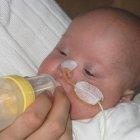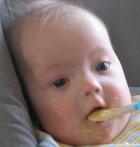The Mouth Circus
Better eating and communicating for every child
Background
Sometimes young children do not want to eat. This is not extraordinary. Around 25% to 45% of toddlers and infants make a scene around the family meals. Parents can ask advice from the local pediatrician on how to deal with these situations.
With real feeding disorders we often see cases of insufficient mouth motor skills. Speech or language delays can develop through several causes. If a child does not tolerate solid food in the mouth, or is not used to biting and chewing, then the motor skills to speak correctly are also not yet developped. So a correct approach to treating basic mouth motoric delays is very important. These skills are not only necessary for good eating practices but are also indispensable in order to learn to how to speak correctly.
Children with a delay or past/present medical problems often have negative experiences concerning eating and drinking. Or simply not enough early experience with eating and drinking. These children are not able to eat normally. They are nervous, gag frequently, vomit or are only able to eat small quantities of specific foods very slowly. It is not easy for parents to handle these daily recurring eating problems and so we see conflicts and communication problems arise during the meals. Children can start to refuse food because they find eating difficult and scary.
In The Netherlands around 11% of parents seek out professional advice because the eating problems of their child persist. By helping these children as early as possible they will have better opportunities for the future and we can save considerable costs.



